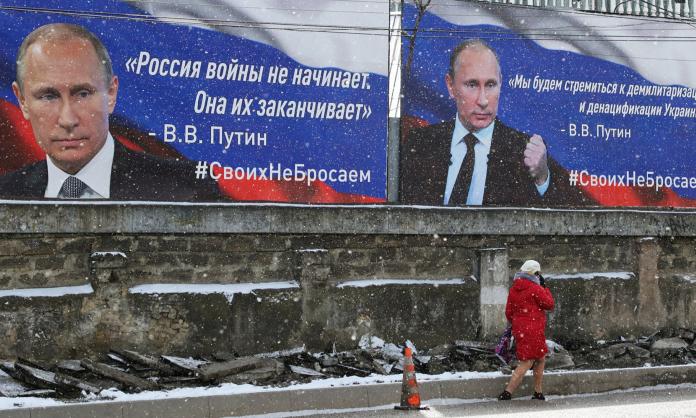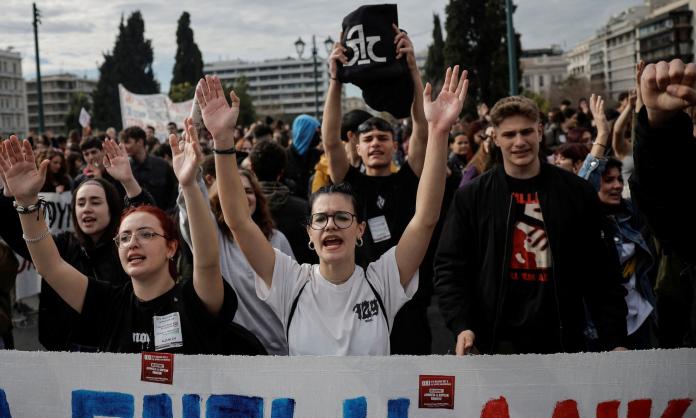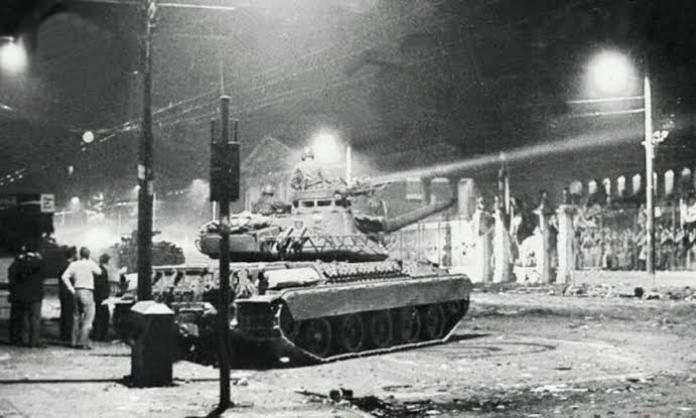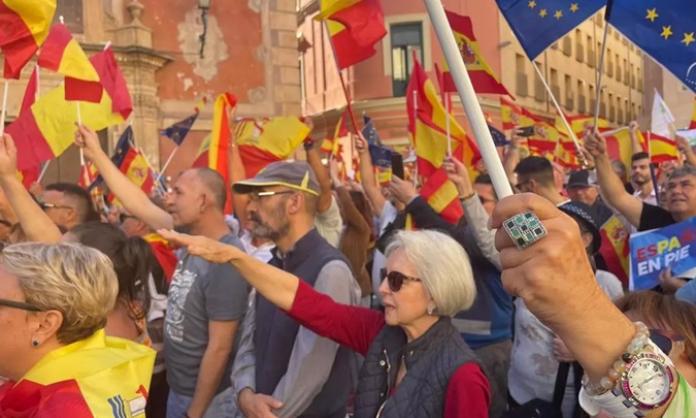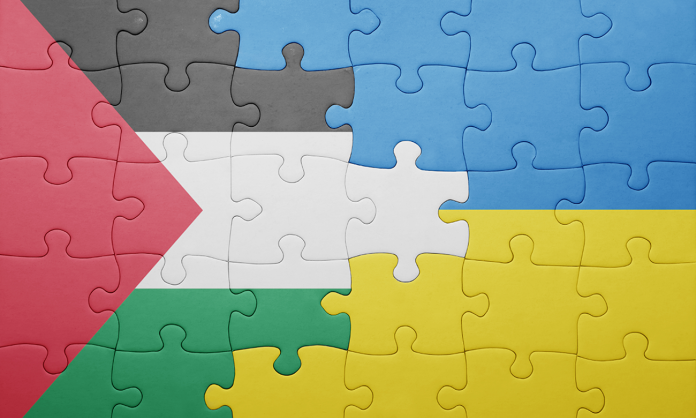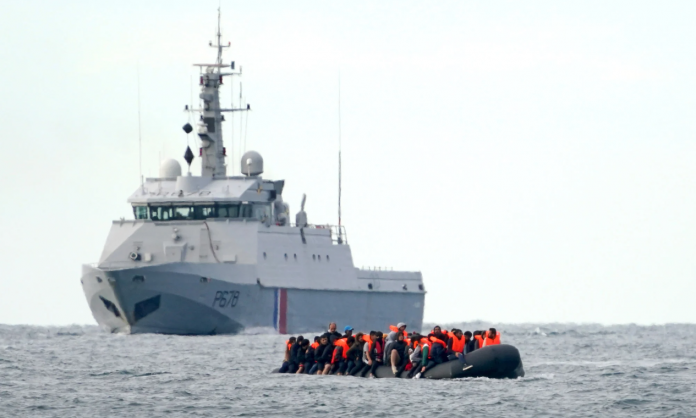Russian dictator Vladimir Putin is facing the biggest challenge of his twenty-year rule as his invasion of Ukraine spirals into a multidimensional crisis for the Russian regime and ruling class.
The invasion has not resulted in a swift and easy victory—Ukrainians have taken up arms in droves and have fought heroically. The Russian army has suffered heavy casualties and lost loads of military equipment. A 64km-long convoy of Russian tanks attempting to take the capital, Kyiv, has been bogged down on the outskirts of the city for two weeks. If the Russian military does prevail, ongoing Ukrainian resistance will make it difficult to establish a stable government loyal to Moscow.
On top of this, anti-war protests involving thousands of people have swept Russia. It is difficult to get accurate reports about the size of the protests because of censorship within the country, although they are clearly widespread. According to the human rights monitoring group OVD-info, 14,000 people have been arrested in at least 147 different cities since the war began.
Further, the Russian economy is tanking under the weight of international sanctions that have cut access to credit and other markets. Economists predict that this will be the worst crisis since the fallout from the collapse of the USSR in the 1990s. Western brands are closing their doors, and there are reports that some essential goods are being rationed. Putin has floated nationalising foreign companies to seize their assets in retaliation and deal with an impending unemployment crisis.
Yet the president’s power within the country has to date been almost total—no serious rival has ever emerged from within the ruling clique, and he has successfully repressed oppositional currents in politics, the media and wider society. This is despite him overseeing a deeply unequal country split between a small clique of billionaires and millions of ordinary Russians who have few rights and no wealth. How has this been possible?
Putin came to power following the tumultuous 1990s, a decade of dire poverty for Russian workers and most of the middle class. In the 1980s, the Soviet dictatorship was in a state of catastrophic crisis and there were mass shortages of consumer goods. Many hoped that the collapse of the dictatorship would improve their living standards, but the crisis only deepened during the market reforms of the 1990s. Rapid deregulation and privatisation destroyed millions of lives but allowed a select few to amass billions of dollars.
Initially, Putin was seen as something of a saviour. His rise fortuitously coincided with a dramatic increase in energy prices, which bolstered Russia’s export revenues. Incomes rose, unemployment and poverty rates declined, and the mass non-payment of wages and social entitlements came to an end. Ordinary people’s lives stabilised after two decades of crises.
He also seemed to be disciplining some of the worst excesses of the new billionaire class through an anti-corruption drive that jailed some of the country’s wealthiest individuals and renationalised much of the energy sector. In reality, Putin was snuffing out the billionaires who opposed his rule, while appointing loyalists to top positions in the state administration, through which they amassed their own riches.
Putin remained very popular throughout the 2000s—his approval rating never dipped below 70 percent during his first two presidential terms. The oil-fuelled economic boom gave him leeway to secure dictatorial control: in addition to disciplining his potential rivals, Putin gained control over major media outlets and changed the constitution to make it very difficult for a legitimate political opposition ever to emerge.
Alongside taking control of the country domestically, Putin embarked on a project of re-establishing Russia as a serious imperial force. When the Berlin Wall fell and the USSR was torn apart, Moscow lost control over much of its empire. It lost the Cold War not through a direct military defeat, but through internal disintegration.
Putin first rose to national prominence in 1999, during Russia’s second assault on the Chechen Republic, which was fighting for independence. Five months into his first term, Russia established direct rule over the territory. The next shot was fired in 2008 with the assault on Georgia, which borders Russia to the south, and again in 2014 when Russia annexed the southern Ukrainian Crimean peninsula.
Over the last decade, Putin has sent the Russian military beyond the borders of the old empire, entering conflicts in Syria and Libya. Russian mercenary troops have also been waging battle in eastern Ukraine since 2014.
This has all been disastrous not only for those on the receiving end of Russia’s firepower, but also for ordinary Russians. The economy crashed after the 2008 global economic crisis and living standards have stagnated or slid backwards.
These military adventures nevertheless have been popular, at least until now. Putin’s approval rating spiked after the 2014 annexation of Crimea, as it had fifteen years earlier with the bombing of Chechnya. An ideological climate of conservatism and nationalism has dominated the country for almost ten years, at least among older Russians. The West played a big role in the chaos and destruction of the post-Soviet years, and Putin turned a sense of national shame into a resurgent nationalist pride.
However, while he embarked on empire-building, domestic tensions did develop. Russian workers paid for the post-2008 recession with cuts to wages, employment and social services. In 2019, the Credit Suisse Research Institute’s global wealth report found that Russia had the world’s highest levels of wealth inequality—the richest 500 Russians, or 0.001 percent of the population, have more wealth than the poorest 99.8 percent.
In the lead-up to the 2011-12 election cycle, which was rigged in favour of Putin’s United Russia Party, many people demanded open and free elections. In Moscow, 100,000 people protested. Demonstrations continued into 2013 but were ended by the intransigence of the regime and a wave of repression. They picked up again in 2017, when accusations of corruption against former Prime Minister Dmitry Medvedev triggered protests that escalated after Putin raised the retirement age by five years.
As the decade wore on, resistance to Putin coalesced around opposition leader Alexei Navalnyi. Navalnyi is no progressive—he has a history of anti-migrant Russian chauvinism, and his economic program looks to the free-market model of Western capitalism. But his anti-corruption campaigning struck a chord with those disillusioned with Putin’s dictatorship. The organised opposition has now been smashed by the regime—Navalnyi barely survived an assassination attempt by the Russian security service in 2020. He is now in jail and his organisations have been disbanded. But the conditions which gave rise to the opposition remain.
The sole independent polling agency in Russia, the Levada Center, reports that a majority of Russians are dissatisfied with the country’s rulers and believe that the people in power are concerned only for themselves. Still, Putin has maintained a wide base of personal support. The lowest his approval rating ever hit was 62 percent in 2013 and 59 percent in May 2020. Time will tell what effect the Ukraine war and associated economic collapse, coming on the back of the country’s COVID crisis, will have on the president’s domestic reputation.
The invasion of Ukraine goes far beyond any of Putin’s previous incursions by every measure. Rather than assisting a foreign dictator or trying to carve off small territories containing Russian loyalist fighters, this is a full-scale invasion that has provoked a war of national liberation. The UN estimates that 5-6,000 Russian soldiers have been killed.
Having failed to win a quick victory, Putin is employing dirty tactics to pound Ukrainians into submission. He is starving out and bombing cities, and breaking humanitarian ceasefires to prevent aid and medical supplies from reaching those still stranded. On 9 March, Russian forces reportedly bombed a maternity hospital.
Recent polling released by the Washington Post (based on anonymous but supposedly reliable sources inside Russia) indicate a population split over support for the war: 58 percent expressed support, but the support was lower among young people, among those living in major cities and among those who feel that their financial situation has worsened in the last year.
Putin is playing a dangerous game. He is clearly serious about this assault and has continued to push through despite the significant consequences. He is destroying Ukraine and destroying his own people in the process. Could this grandest plan yet for a new Russian empire be the cause of his downfall?




